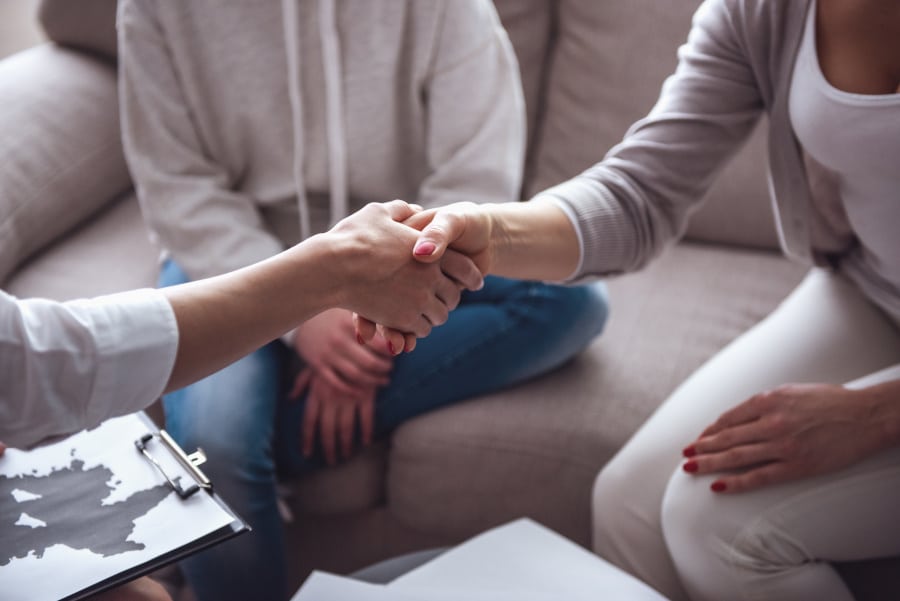Catch Anorexia Symptoms Early On
One of the most common and tragic problems with eating disorders is that people take a long time to 
Anorexia symptoms are particularly important to recognize because of anorexia’s frighteningly high mortality rate. In fact, individuals between the age of 15-24 with anorexia have 10 times the risk of dying compared to others their age.
The signs are broken down here into two main categories: physical symptoms and emotional or behavioral symptoms. If you see the following changes in a loved one, Selah House can help. Our evidence-based treatment gives women the coping skills needed to find freedom from their eating disorder. We provide the best anorexia disorder treatment Indiana has to offer as well as the state’s premier women’s eating disorder treatment.
Physical Symptoms of Anorexia
These symptoms of anorexia are things you will be able to detect by looking at a person’s body or health.
- Dramatic weight loss
- Scarred or blistered knuckles
- Stained teeth from vomiting
- Intolerance of cold
- Consistent lightheaded
- Excessive sleep or a lack of sleep
- Dry, brittle nails
- Thin, fragile hair
- Poor wound healing
- Yellowing skin
- Stomach cramps
These symptoms of anorexia nervosa range from obvious to more subtle. Individuals are also able to hide some of these symptoms. For instance, some people wear excessive layers to hide their weight loss or to keep warm. It’s also worth noting that almost none of these symptoms are enough to draw definitive conclusions alone. It’s when you see multiple symptoms, in conjunction with the behavioral changes, that you should take action.
Emotional or Behavioral Symptoms of Anorexia
These symptoms of anorexia are going to be more specific to the individual. Everyone has their own “version” of these behaviors. The better you know the person, the more equipped you are to notice.
- Preoccupation with food, weight, or dieting
- Cooking food for others while not eating
- Denying feeling hungry
- An overly rigid exercise regimen
- Irritability
- Inability to focus
- Consistently expresses feeling fat
- The compulsive need for control
- Being socially withdrawn
- Food rituals like eating food in a certain order or excessive chewing
These symptoms can go unnoticed for too long, and often co-occur with other mental health disorders such as anxiety or depression. The biggest thing to look for is not just the presence of these symptoms, but any changes. It’s one thing if someone is normally shy or quiet, but if your loved one becomes significantly more reserved than expected, it’s worth noting. Of course, noticing these behavioral changes also goes hand in hand with looking out for the physical symptoms of anorexia nervosa.
How can I help?
Helping someone with anorexia, or any eating disorder can be difficult, but there are some steps that can make it easier.
- Get educated. There are many myths floating around about eating disorders. Learn more about the disorder and differentiate between the myths and the facts.
- Start the conversation. A key factor in ending the stigma that often surrounds any mental health condition is talking about it. When you have a loved one you are worried about, start the conversation by telling them you are concerned without being judgmental. Waiting until the symptoms become severe could be too late.
- Praise and compliment. Remind them how valuable they are and that true beauty comes from inside. Knowing that someone else values them and appreciates them for who they is vital.
- Encourage them to seek help. Encourage your loved one to seek help. A primary care doctor or a psychiatrist can help determine if a higher level of care is needed.
At Selah House, we encourage you to combine your mindfulness with gentleness and compassion. Anorexia symptoms can be embarrassing and hard to admit. So if you think your loved one struggles with anorexia, make it clear that you are here in a supportive role. Also, stress the importance of professional anorexia treatment and aftercare.
Eating disorders are so scary because they make a person feel out of control. We are here to give that control back to you or your loved one. If you see the symptoms of anorexia in a friend, don’t wait. Get help today! Contact Selah House at 765.442.3551 to see what we have to offer and if we are right for you.

 Call
Call

